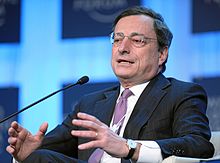Mario Draghi
Italian economist, academic, banker and politician; former prime minister of Italy
Mario Draghi (Italian pronunciation: [ˈmaːrjo ˈdraːɡi]; born 3 September 1947) is an Italian banker and economist who succeeded Jean-Claude Trichet as the President of the European Central Bank on 1 November 2011. He was previously the governor of the Bank of Italy from January 2006 until October 2011. He played a major role in Italy's response to the Great Recession and the European Union's response to the European debt crisis. In 2013 Forbes nominated Draghi 9th most powerful person in the world. He was later appointed Prime Minister of Italy in charge of a government of national unity during the COVID-19 pandemic in 2021, but resigned in 2022 after a vote of confidence failed to pass by an absolute majority.

Mario Draghi - World Economic Forum Annual Meeting 2012
| This economist article is a stub. You can help out with Wikiquote by expanding it! |
Quotes
edit- Within our mandate, the ECB is ready to do whatever it takes to preserve the euro. And believe me, it will be enough. (26 July 2016, speech to Global Investment Conference in London)
- In Greece, the position at the outset was particularly difficult, so now we have to be particularly patient with the country. That's no surprise.
- It is too early to assess the policies of the new German government. I can only say that the crisis has shown that the monetary union is incomplete and that the weaknesses need to be remedied. Germany helps the euro best by further strengthening its competitiveness and promoting growth.
- One needs a complex package of policies and, as we always stress, structural reforms come first, because many of the problems of the euro area are structural. And I'm sure that's also the biggest fear for the Governing Council as a whole. We discussed the possibility of negative deposit rates, but our objective is maintaining price stability.
- The crisis has not been overcome, but there are many encouraging signs. The economy is recovering in many countries, the imbalances in European trade are declining and the budget deficits in the monetary union are falling.
- The signals from the monetary analysis confirm the picture of subdued underlying price pressures in the euro area over the medium term.
- ... "the Continent's traditional social contract" - perhaps its major contribution to contemporary civilization - "is obsolete" and must be dismantled.
- truth-out.org, Kommentar in spiegel.de/international
- (Italian language) L'appello a non vaccinarsi è un appello a morire sostanzialmente - non ti vaccini, ti ammali, muori - oppure fai morire - non ti vaccini, ti ammali, contagi lui lei muore -, questo è.
- The appeal not to get vaccinated is a call to die substantially - you do not take vaccine, you get sick, you die - or you make die - you do not take vaccine, you get sick, you infect, he/she dies - this it is.
- www.governo.it/it/articolo/conferenza-stampa-draghi-cartabia-speranza/17515
- July 22, 2021 - As Prime Minister of Italy, regarding the "vaccines" against Sars-Cov-2 / Covid-19
Quotes about
edit- ECB [European Central Bank] President Mario Draghi’s famous promise to do ‘whatever it takes’ to preserve the eurozone was a masterly move to buy time. But monetary policy cannot solve the currency union’s problems.
- Robert Rubin, "The Search for a Monetary-Policy Wizard and Political Moral Hazard", Wall Street Journal (February 23, 2015)